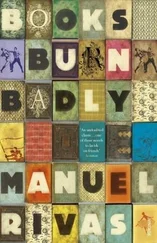Manuel Rivas - The Low Voices
Здесь есть возможность читать онлайн «Manuel Rivas - The Low Voices» весь текст электронной книги совершенно бесплатно (целиком полную версию без сокращений). В некоторых случаях можно слушать аудио, скачать через торрент в формате fb2 и присутствует краткое содержание. Год выпуска: 2016, Издательство: Harvill Secker, Жанр: Современная проза, на английском языке. Описание произведения, (предисловие) а так же отзывы посетителей доступны на портале библиотеки ЛибКат.
- Название:The Low Voices
- Автор:
- Издательство:Harvill Secker
- Жанр:
- Год:2016
- ISBN:нет данных
- Рейтинг книги:5 / 5. Голосов: 1
-
Избранное:Добавить в избранное
- Отзывы:
-
Ваша оценка:
- 100
- 1
- 2
- 3
- 4
- 5
The Low Voices: краткое содержание, описание и аннотация
Предлагаем к чтению аннотацию, описание, краткое содержание или предисловие (зависит от того, что написал сам автор книги «The Low Voices»). Если вы не нашли необходимую информацию о книге — напишите в комментариях, мы постараемся отыскать её.
A brilliant coming-of-age novel from one of Spain’s greatest storytellers,
is a humorous and philosophical take on memory, belonging, and the nature of storytelling itself.
The Low Voices — читать онлайн бесплатно полную книгу (весь текст) целиком
Ниже представлен текст книги, разбитый по страницам. Система сохранения места последней прочитанной страницы, позволяет с удобством читать онлайн бесплатно книгу «The Low Voices», без необходимости каждый раз заново искать на чём Вы остановились. Поставьте закладку, и сможете в любой момент перейти на страницу, на которой закончили чтение.
Интервал:
Закладка:
‘I may have been one of them.’
And he added with a certain pride, glancing around:
‘I may even have been the driver.’
Uncle Francisco held his nerve. Wiped the cut-throat against the leather. Swept it over the old man’s face until removing the last speck of foam. Gave him a few smacks of aftershave. Splish, splash!
‘Don’t ever come here again.’
‘How much do I owe?’ said the other in surprise.
‘Use it to pay for some Masses. Nothing you do will ever be too much to save your soul.’
Whenever he remembered that day, a shadow fell over his eyes. He explained about the razor, his self-restraint over his instinct, not as something that deserved praise, but as a simple condition, the way a good storyteller should be able to hold his nerve.
A few years later, I again see María on a table, surrounded by people. It’s in Leonor’s shop and pub, in Castro de Elviña. One summer’s afternoon, after lunch. Most of the men are outside, working. The hour and the absence of men allow the women to be inside the shop, in the shade. They’re also working. Sewing, embroidering, knitting. And María is standing on top of the table. Reading the newspaper aloud. From time to time, they ask her to repeat something. An incident, perhaps. There is no radio or television. María is reading with the lantern of her green eyes, in the midst of a friendly silence. After a while, they lift her down off the table. Caress her. Give her a banana and some cherries. She shares this first wage. Of cherries.
Corpo Santo tasted of cherries.
This was the place where my maternal grandfather, Manuel, lived. We never knew our maternal grandmother, Xosefa. She died young, because of an illness, and left behind ten children. Two perished during the misery that followed the Spanish Civil War. Before that, during the coup of 1936, a Fascist group arrived in the night and dragged my grandfather outside to ‘take him for a walk’. He was Republican. And Christian. He was also secretary of the Farmers’ and Stockbreeders’ Mutual. The fact he could write must have been his downfall. On one occasion, he refused, as secretary, to draw up and sign a contract for the sale of cattle in bad condition. Another time, he declined to validate a sale that had been agreed late in the night, after a card game. On such occasions, Manuel of Corpo Santo’s expression of resistance, his way of saying ‘I would prefer not to’, was ‘Gentlemen, we’re out of time!’ Whenever he went to the mountain for firewood or animal bedding, he would use the fact he was alone to read or write. He lost all sense of time. And he was lucky that death, in this case, also lost all sense of time. Because he was saved by a miracle. He was saved by the shout of the parish priest, whose conscience had taken him to the scene of the crime on horseback.
So it was that, in Corpo Santo, four boys and four girls were raised by my grandfather. They grew like cherry trees. The orchards in Mariñas Douradas, the name of that region, preserved the memory of the French song ‘Time of Cherries’. I associate the happiest days with blackbirds. Sometimes, around the beginning of July, a swarm of us cousins would spend the whole day up in the trees, sharing the treasure with mocking blackbirds. When we were small, we stayed there for long periods. As I would often wake up in one bed, having gone to sleep in another, so, for me as a child, it seemed there was a secret passageway linking the hill with the lighthouse to the staircase in Corpo Santo.
The one who really communicated with a large part of the world was my grandfather. He did this from a table he used as a desk, on the upper floor of the house. It was one of those unpredictable places where the globe alights in order to rest. The globe gives the impression it never stops, it orbits, suspended in space, turning on its axis, but this is very tiring and from time to time it looks for somewhere to set down. When the globe settles on a particular point in the world, something happens. To my mind, it used to alight on that modest desk, where there were piles of postcards and letters from the diaspora. Addresses, stamps, photographic views, where the colours of the Promised Land, primary and intense, fermented. The postcards formed a kind of mappa mundi . He was a real writer. As the ancient Greeks used to say, ‘an interpreter of interpreters’. He wrote letters to emigrants. The ‘widows of the living’ would come, and he would write down news items and feelings that crossed the sea, beyond Marola, the islet that gave our street its name, the mark of farewell on the bay’s mouth. He had very good handwriting. The letters looked like vegetal landscapes. Over in America, if the reader knew how to read, he would see each word and everything named by it, perhaps even a little more. What hadn’t been said.
Apart from the small planetary desk, there was another extraordinary place in Corpo Santo. A staircase with pine steps and wooden sides. It led from the hard-packed earthen floor downstairs to the wooden floor on the second level, where the bedrooms were and the chests with items of value: deeds, seeds and dowries.
During the day, everybody worked hard. But when the frontier of dusk was passed, a wonderful metamorphosis took place. The silent creatures hung their work up on a hook and were summoned to a second life. Around food, wine and fire, words came, bringing news and stories. Downstairs, opposite the hearth, was the cowshed. The cows poked their heads out of the mangers, three irrepressible forces sucking grass and blowing out clouds of steam. The cows’ breath was what covered the valley of Corpo Santo every morning. This factory of mist, so realistic, was like a children’s story. The adults had other stories for themselves. Stories about the Holy Company, the souls of nostalgic dead people who hanker after a coffee with a few drops of brandy. Wolf stories, with wolf men and women. Adventure stories, stories of emigration. The stowaway who can’t make up his mind to get off the ship and so spends his life going to and fro, a secret man, hidden. Stories of fugitives on the mountain, the Maquis. Of crime and revenge. The man who heads to the festa , intending to kill a rival, but when he hears the music, reconsiders and throws the knife away, and when the party is over, the other, the one who was due to die, finds the weapon, the moon glinting on its blade, and takes it up, determined, with a fixed purpose … Stories of passionate love. In an enclosed convent, where the nuns make dummies of the infant Jesus to sleep next to on Christmas Eve …
That was the point at which we were supposed to visit the fields of sleep. The children, off to bed. We went, groaning or pretending to groan. Because we knew this expulsion was not serious. We would remain, invisible and clandestine, sitting on the top step, under a lamp that transmitted the wind outside, the intensity of the stories, the embers of the fire and our hearts. In that lamp, suspended by a twisted wire, light came and went without doing so completely. It was a place of intermittences that attracted moths. The elders’ talk kept step with the fire’s humour, and our ears with the lamp upstairs. In the window above the sink, we could see the reflected faces talking in the half-light, as if they belonged to another time that was not the past, but was just that: another time. The words fed on the flames, but there came a moment when they fled from the fire into the dark …
There were unforgettable nights. As when a letter was read out from a suitor of my aunt Maruxa, a girl of seismic beauty.
To demonstrate his virility, the suitor had written a letter that was recited many times around the fire in Corpo Santo. It began with a wonderful snippet of information: ‘Yesterday, I saw you at the fair and you should know that I didn’t talk to you.’ The laughter made the flames flicker. Further down the page, the gallant author of the letter proceeded to enumerate his properties in order to impress and captivate the letter’s recipient. He recorded in calligraphic acres an unending estate of fields, meadows, hills and plots of land. He then gave details about his livestock: ‘You should know that we combine seven cows, x number of pigs and at least a hundred Leghorn chickens.’ He then added, quite naturally, ‘And a father in disconformable health.’
Читать дальшеИнтервал:
Закладка:
Похожие книги на «The Low Voices»
Представляем Вашему вниманию похожие книги на «The Low Voices» списком для выбора. Мы отобрали схожую по названию и смыслу литературу в надежде предоставить читателям больше вариантов отыскать новые, интересные, ещё непрочитанные произведения.
Обсуждение, отзывы о книге «The Low Voices» и просто собственные мнения читателей. Оставьте ваши комментарии, напишите, что Вы думаете о произведении, его смысле или главных героях. Укажите что конкретно понравилось, а что нет, и почему Вы так считаете.












